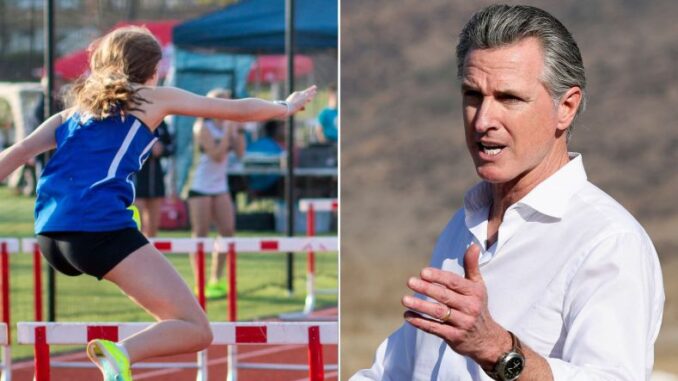
Yesterday’s move by the California Interscholastic Federation (CIF) wasn’t just a technical policy adjustment; it was a pivotal acknowledgment in the broader national debate on trans participation in female athletics. The CIF governing body for high school sports in a state known for progressive policies unveiled a new “pilot entry process” aimed at increasing fairness for biologically female athletes. While framed as a routine eligibility tweak, it represents a subtle but significant shift: a public admission that objections from female athletes and their parents have merit and that trans athletes and biological females are not interchangeable in competition.
This policy change followed public outcry, amplified by a Truth Social post from Donald Trump criticizing the inclusion of a trans athlete, A.B. Hernandez, who dominated multiple girls’ track and field events. Trump vowed to cut federal funding if California continued to allow what he calls “men in women’s sports.” Just hours later a coincidence, according to Gov. Gavin Newsom’s office CIF announced that girls who narrowly missed state qualification would be granted entry under the new pilot rule.
CIF framed the change as an opportunity-expanding measure for “any biological female” who just missed automatic state qualification a rare departure from its long-standing policy promoting trans inclusion based purely on gender identity. In effect, the policy change implicitly acknowledges the physical advantage that trans athletes might have, something CIF had previously treated as a discriminatory claim.
Critics of the move, such as former NCAA swimmer and activist Riley Gaines, say the measure falls short, as it doesn’t prevent trans athletes from competing in girls’ events it merely tries to patch over the consequences. “CIF is admitting girls are being displaced,” Gaines argued, “but they still prioritize the boys’ feelings.”
Until now, California’s sports authorities maintained a strict pro-inclusivity stance. Their 2013 toolkit promoted unrestricted access for trans students based on self-identification, and objections were labeled discriminatory. This new move subtly departs from that orthodoxy not with words, but with policy.
Gov. Newsom, long seen as a progressive stalwart with potential presidential ambitions, also appeared to shift. In a recent podcast with conservative activist Charlie Kirk, Newsom openly admitted that trans inclusion in girls’ sports raises fairness concerns a far cry from his silence when California enacted its trans-inclusive laws over a decade ago.
Yet, his response to the CIF policy has been measured. A spokesperson called it a “reasonable, respectful” approach. Still, Newsom’s cautious tone and alliance with Kirk sparked backlash among Democrats and LGBTQ+ advocates. State Senator Scott Wiener blasted the appearance with Kirk, and trans activist Erin Reed accused Newsom of political posturing, not principle. Assembly Member Alex Lee warned such positioning would alienate core Democratic voters.
For many in the Democratic base, any suggestion that trans inclusion in girls’ sports is unfair is beyond compromise. And Newsom’s balancing act voicing fairness concerns while avoiding definitive policy shifts might be politically perilous. In attempting to appeal to centrists, he risks alienating the very progressives who would form the backbone of any future presidential campaign.
The CIF’s new pilot program is not a final solution, but it is a crack in the once-unyielding wall of trans athletic policy in California a signal that the conversation has entered new territory. And for political figures like Newsom, the fallout may have only just begun.
Be the first to comment